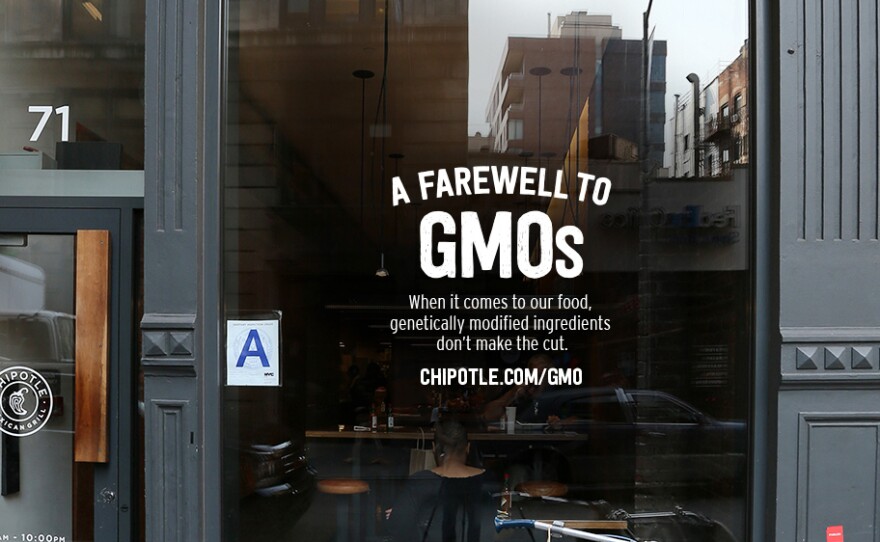
Fast-casual food chain Chipotle Mexican Grill has announced it has removed all ingredients made with genetically modified organisms from its menu, making good on a two-year-old promise. It's the latest example of the food industry stripping away ingredients, some more questionable than others, as consumers demand a say in what's in their dinner.
There is no scientific evidence that GMOs pose a risk to health, as Chipotle founder and co-CEO Steve Ells readily acknowledges. "I don't think this is about GMOs being harmful or not being harmful to your health," Ells tells The Salt. "It's a bigger picture. It's really part of our food with integrity journey."
After Chipotle committed to ditching GMOs in 2013, its corn and flour tortillas were among the hardest items to revamp. But they're now GMO-free, thanks to Chipotle's collaborations with suppliers to plant non-GMO corn varieties. The soybean oil in the chips and taco shells, which was GMO, has also been replaced with non-GMO sunflower oil.
But the journey isn't done: Chipotle still uses meat from animals that may feed on GMO corn or soybeans. Ells says he wants to change that, but it will likely take several years.
Michael Moss, author of Salt Sugar Fat: How the Food Giants Hooked Us, applauds Chipotle's move to remove GMOs from its menu. "I'm ambivalent about GMOs, personally," Moss tells The Salt, "but I think Chipotle, with this move, is once again showing how fast it's positioning the company to respond to its customers' concerns about food."
While Chipotle's announcement isn't so surprising, given its ethos of prizing fresh, high-quality ingredients, it's also part of a broader trend. These days, product reformulations, revamped recipes and changes in sourcing are increasingly becoming the price of doing business in the food industry.
Just last week, Pepsi announced it was getting rid of aspartame – a sweetener federal regulators long declared safe in the amounts commonly used by the food industry — in Diet Pepsi; and Kraft announced it was dropping artificial dyes in its iconic bright-orange Macaroni & Cheese dinner. Earlier this year, McDonald's said it would start sourcing chicken raised without antibiotics, and Nestle declared it would dump artificial colorings and flavorings from its chocolate candies. Last year, a campaign that included 40,000 Facebook posts helped convince General Mills to make Cheerios non-GMO. Another campaign swayed Subway to remove the additive azodicarbonamide from its breads.
Moss says falling sales and consumer-safety concerns are driving large food firms to change their products.
"When consumers get concerned about one ingredient or one additive and that shows in a drop in sales, the companies go crazy and work as hard as they can to get rid of that," Moss says. "They're incredibly sensitive to sales figures. We've seen one company after the next reporting horrific profits. They blame it on consumers getting concerned about what they put in their bodies."
But some of the recent fervor around stripping additives from processed foods misses the bigger picture, says Michele Simon, a public health lawyer, blogger and critic of the food industry.
"Just tinkering with the ingredients in highly processed food is not going to make a dent in Americans' overall poor diet," Simon tells The Salt. "The strongest scientific evidence calls for Americans to increase their intake of fruits and vegetables. I just want that bigger-picture perspective included."
Billy Roberts, a senior analyst for food and drink at Mintel, a market research firm, agrees that consumers are leading the way when it comes to demanding products that are GMO- and additive-free.
Roberts points to a survey of 2,000 Internet users 18 and older the company conducted in January. About 40 percent of participants indicated they would like food companies to stop using artificial sweeteners. And Roberts says following Pepsi's announcement that it will stop using aspartame, he won't be surprised if Coca-Cola announces a similar move.
"I don't know of anyone who has dug in their heels on this," Moss says. "These companies are not brave like that. They're risk-averse. They'll go whichever way public opinion goes. It's just a matter of time."
Copyright 2015 NPR. To see more, visit http://www.npr.org/.





